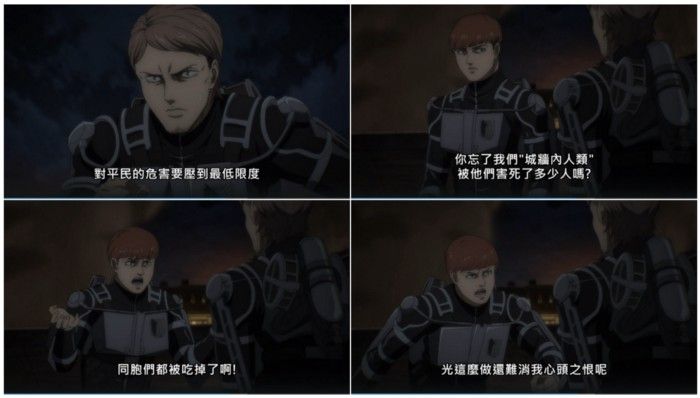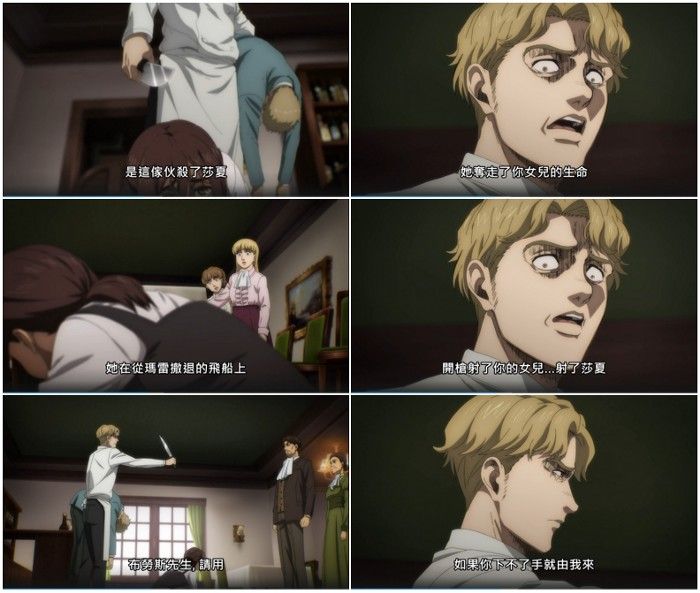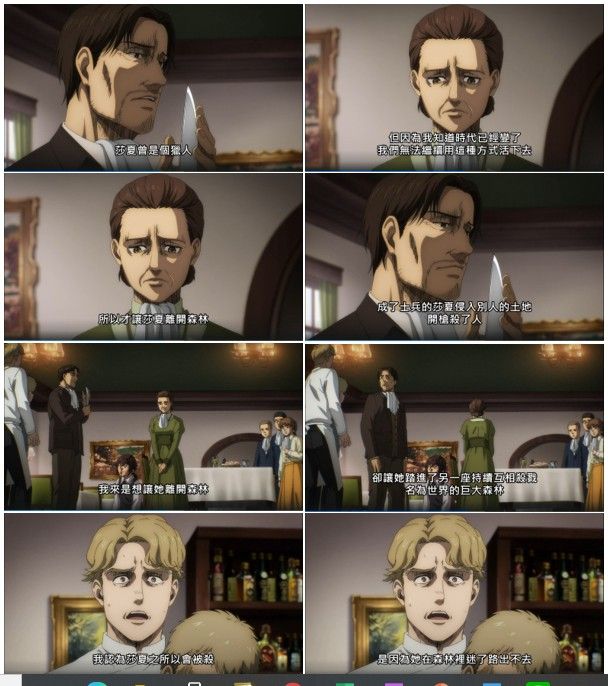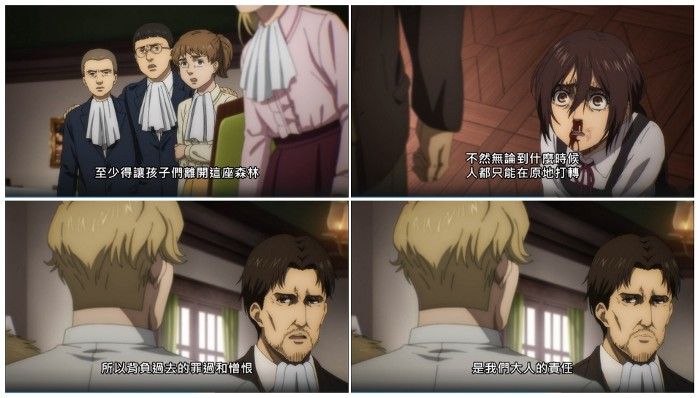📚📑📝: Attack on Titan | Cycle of Killing
"The best way to mobilize all the citizens of a country is to create a common external enemy." ──《1984》
In the fourth season, the representatives of the "revenge justice" that the Mare Empire believes in and the "formal justice" derived from the country are: the soldiers in the domestic training camp and the parents of the soldiers. And through these two kinds of justice, the Mare Empire has shaped the Eldia nation into a demon-like existence, and such unclean souls should be eradicated.
Jia Bi, one of the believers of revenge justice, believes that what he learned in the training camp is to assassinate the Eldians. Jia Bi also believes that the world will be a better place without them, and there will be no more wars. ; Parents under formal justice also agree with their children's foreign expedition, and even if they are promoted to obtain the ability to inherit giants, their parents will consider it an honor.
No matter what social context, killing is always regarded as bad and immoral; but killing in the name of "eradicating bad elements", can this wash away the inherently negative perception of killing? In fact, this kind of massacre of ethnic cleansing in the name of the state is very common in a state of war; however, such cleansing on the one hand promotes the racial superiority of one's own country, on the other hand, it also smears the "cleanness" of one's own race. This kind of comparison mentality between races will not stop one day. As long as human society allows such an unequal comparison mentality, endless discrimination, hatred and even killing will follow, and eventually it will inevitably enter a cycle of killing.
Who does revenge killing satisfy?
In the animation of the fourth season, we saw the invasion planned by the Eldians against the Mare Empire. During this invasion, the accomplices of the Survey Corps began to argue about the "acceptable range of wounded".

Here we see the revenge of Hammurabi's code, and since you have killed my fellows, I must end your comrades for that purpose; however, John in the same regiment says " Conditional Harm” counters his reckless looting. In many movies and animations, we can often see that the protagonists can often kill for a certain idea. These works seem to regard "killing" as a light thing. However, this is not the case with human beings in real life, and the conditions on the battlefield are even more different from the description of the film.
"On Killing: The Nature of Murdering" ( On Killing ) by Dave. Dave Grossman is a war historian. He found from historical warfare research: in World War I, most soldiers shot at the sky; in World War II, the direct shooting rate of U.S. infantrymen at the enemy was only about 15%. Dave compiled the data, and the troop commander observed and encouraged during the battle. Almost all soldiers would fire. Once the commander left, the firing rate immediately dropped to 15% to 20% .
Starting from these facts, Dave argues that humans have an instinct to resist killing (especially of their own kind) . Compared to the fight-or-flight form, Dave thought it was necessary to add the possibility of "bluffing" and "submission" when facing attacks from similar creatures. The reason why the soldiers who refused to shoot was one of the main reasons for the intimidation effect of the explosion sound produced when the gun was fired, rather than causing the enemy to die.
So all the descriptions in the movie are fake?
Not really, Dave mentioned that humans have an instinct to resist killing, and this is particularly the case with humans . As long as the object is not like a person, the possibility of killing it can be greatly increased; therefore, the targets set in many shooting sites are not designed with the appearance and image of a person, and even the half-length portraits are made of rubber. made, the appearance is still a far cry from a real human being. Therefore, if we want to ignite the cruelty and killing in the human heart, we must "dehumanize" the slain.
.
Stanford Prison Experiment
In the 1970s, Stanford University ( Stanford University ) conducted a controversial psychological experiment, the Stanford Prison Experiment ( Standord Prison Experiment, SPE ) American psychologist Philip. A research team led by Philip G. Zimbardo conducted a study in a mock prison in the basement of Stanford University's Department of Psychology Building on human responses to captivity and the effects of captivity on the behavior of authorities and supervisors in prisons. psychological research. The guards and prisoners were all college student volunteers. The expected duration of the experiment was two weeks, but it was forced to terminate on the sixth day due to various unexpected situations. Prisoners and guards quickly adapt to their roles, and the dangers and injuries increase. A third of the guards were thought to display "true" sadistic tendencies, and many prisoners were psychologically traumatized, with two having to withdraw early from the experiment.
Prison guards who were originally college students pretending to be college students, how could they attack each other who are also college students? One of the key conclusions of Professor Zimbardo's subsequent analysis was "dehumanization" , which echoed the findings of Dave's research. In this prison experiment, the disguised prisoners had no names but only cold code names, had to wear stockings over their heads, and even had to be handcuffed. Here, you are not the precious son of your parents, the beloved sibling of your brothers and sisters, Steve, here, you are just "8612"
8612, do me 30 pushups, 30 crunches, 30 jumping jacks!
The prison guards, who were also college students, ordered this to the disguised college prisoners. In "Attack on Titan", the ruler of the Mare Empire also painted a gourd, portraying the Eldians on the other side as a demonic nation that disrupted peace and brought war, rationalizing it in the tone of "dehumanization" The resentment of the rulers for persecuting another nation; just like the "racial purification" policy implemented by the Nazis at the time, the Jews have dirty blood in their bodies, and only Aryans are worth living in this world. However, this one-sided survival of the fittest, without a doubt, has only brought about an endless cycle of killing.
.
Wars do not make winners
At first, the Eldians were indeed a warlike nation, but after the war, the king chose to hide in the island of Parady and live a life of indifference. The Mare Empire believed that its existence still had the possibility of launching wars, so it continued to train. Soldiers in the country crusade the remaining Eldians; and the Eldians who saw their family members, comrades, and friends being eaten by giants resented, and finally captured the Mare Empire again.
War does not make heroes or winners but losers and wounded
Everyone under the war is both the perpetrator and the victim. The cycle of violence must be stopped by human intervention. In the fourth season, the one who took the initiative to break this cycle is Sasha's father, Blaus. Jabi of the Mare Empire shot Sasha to death in an operation, and was imprisoned in the prison on Parady Island. Jabi and Falco, who escaped from the prison, were adopted by Blaus. At a banquet, the chef who entertained Blaus found that Jia Bi was the murderer of Sasha, and wanted to kill Jia Bi in order to avenge Xia's father who killed him. Sasha is a very important existence to the chef. He found the value of being a chef, so he was very angry that Jia Bi killed her.

Seeing the dilemma, Brouse uses the metaphor of the forest to illustrate that Sasha's environment will inevitably endanger her life. In fact, Blaus found that everyone present, including the chef, fell into the metaphor of the killing forest; if you kill Jiabi, you will not be able to satisfy anyone, and you will inevitably change yourself from the victim to the perpetrator.


Blause believes that it is time for retribution; the love-hate relationship of the past is over, and a truce has been drawn for our generation. History will not leave a name for the person who drew the armistice line, but his existence spared the subsequent innocent wounded. as brous said
"It is our adults' responsibility to carry the sins and hatred of the past."
Like my work? Don't forget to support and clap, let me know that you are with me on the road of creation. Keep this enthusiasm together!

- Author
- More